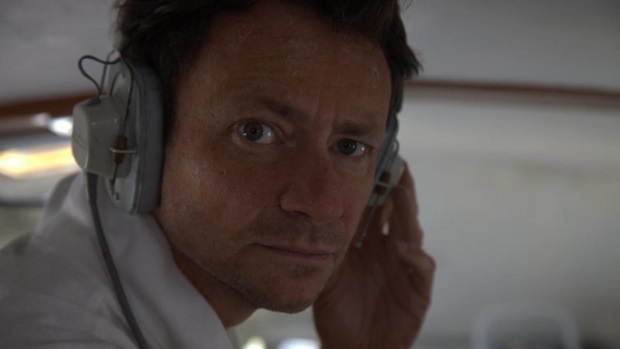David and Goliath: Simon Rumley on the challenges of independent filmmaking
British independent filmmaker Simon Rumley on Crowhurst, the state of British cinema and his next steps...
It’s very likely that, until fairly recently, you’d never heard of Donald Crowhurst. Despite being at the centre of one of Britain’s most intriguing sporting stories — an amateur sailor who decided to compete in a round-the world boat race in 1968, cheated in a misguided attempt to make it home safely then disappeared without trace — Crowhurst has, save for a couple of documentaries and a few music and literary references, avoided making his mark on popular culture. And yet over the past six months, two films have been made about his remarkable endeavour.
Released in February this year, The Mercy is the bigger budget option, a glossy BBC Films production boasting Oscar winners James Marsh, Colin Firth and Rachel Weisz. The second is the lower-budget, more experimental Crowhurst, helmed by British independent filmmaker Simon Rumley (The Living And The Dead, Red, White And Blue, Johnny Frank Garrett’s Last Word). While Rumley was approached by producer Mike Riley about the project in 2014, circumstances meant he had to turn down the offer — only for The Mercy to be announced in January 2015. “I was kicking myself,” Rumley admits when we meet for a frank chat over a pint in Central London a week before Crowhurst’s release.

In February 2015, however, Riley decided to move ahead with his Crowhurst project if Rumley agreed to direct. He did, although by that point, the production budget had “more than halved” and the project needed a more creative approach. Rumley rose to the challenge, and his trademark sensory style, aided by the input of executive producer Nicolas Roeg and an incredible central performance by Justin Salinger, have created an atmospheric psycho-thriller that explores Crowhurst’s increasingly fragile mental state; logs and notes found onboard his deserted boat indicate a breakdown.
Having released The Mercy across the UK, StudioCanal are also handling theatrical distribution of Crowhurst, which will be showing in a handful of cinemas from March 23. Rumley sees this as something of a David and Goliath situation, a battle between studio and independent filmmaking which he’s seen become more pronounced during his almost-20-year career. “I think the more cinema evolves, the less voices there are,” says the director, whose anti-consumerism noir Fashionista, which stars Amanda Fuller as a shopping-addicted woman who descends into paranoia after discovering her partner (Ethan Embry) is cheating on her, is also released on VOD on March 26. “Success is now less about trying to do something different, and more something that works within the mould, while still trying to be exciting.”
Your visceral filmmaking style works well for Crowhurst, the story of one man’s descent into an individual hell. Did you always know you were going to approach it in this hallucinatory way?
Because I have a history of doing films about people in slightly different mental states than the norm, there were tons of things about this film that appealed to me. When we started working on the film, we did know that The Mercy was happening, although it didn’t have its name then. And it was very much like ‘There’s no way that we were going to be able to compete with that more traditional film, so we thought let’s go completely the other way.’
Initially, Andy [Briggs, original screenwriter] had concentrated more on the sailing and the race, and it was more of an All Is Lost kind of thing. I took the script and reshaped it, party in line with my own style and partly because the budget has literally halved because of The Mercy. Then, after a meeting, Mike said he was going off to see Nicolas Roeg because he was working on another film with him. He’s my favourite director, and I had the idea that we should try and get him to exec-produce it, as he had actually tried to get hs version of Crowhurst off the ground in the 1970s. He watched some of my films and came on board. From then onwards we knew we wanted to make it more Roeg-ian!
It’s a very sensory experience, and really thrusts the audience into Crowhurst’s unravelling state of mind. As he is a real figure, and his family survive, did you feel a responsibility to do justice to his character?
One hundred percent. We did lots of research, we understood Donald’s optimism, naivety and, ultimately, his foolhardiness. We wanted to make him a likeable character, someone we could respect rather than paint as a cheat and a loser.
The crazy thing was that even before he set off on the race, he knew it was a bad thing to do. If you look at the photos that were taken in Tinmouth in the week before he left, you can see the fear and worry in his face. In my mind, the breakdown came from guilt. If he’d managed to tell someone about it, that may have been assuaged. But when he was cheating, down in Argentina, he couldn’t talk to anyone because they would have known, from the placement of the radio signal. It was a catalogue of bad things happening, getting worse and worse and worse and weighing on his shoulders.

While The Mercy hasn’t stopped you making Crowhurst in the way you intended, has it had an impact on the finished film?
I see it as a case study of independent filmmaking versus studio filmmaking. It’s genuinely interesting to compare two films which have to follow the same story beats, no matter how obscurely; [Crowhurst] hears about the race, he prepares for the race, he goes in the race, he realises he’s not going to finish the race, and so on. To me that was really a fascinating exercise. I was pretty sure that I was going to be able to make a film that was completely different from the BBC film, and my idea was to release it on the same day, which would have been amazing. Then at some point our financier decided that he didn’t want to do this, he wanted to sell it to StudioCanal.
And were you concerned that they were perhaps buying it with the intention of ensuring it didn’t go up against The Mercy?
I think that was pretty obvious from the offset. There was a contractual obligation that they did have to give it a theatrical release, but it didn’t stipulate whether that was wide or limited. To be honest, they have done the minimum that they are contractually obliged to do.
Is this indicative of a wider problem, that focus is always places on the bigger budget films and independent works can fall by the wayside, regardless of quality?
Yes. One of the biggest problems is, in my experience, my films generally play tons of festivals and win lots of awards, have generally positive reviews, but, frankly, not a lot of people have seen them. You talk to film distributors, you talk to sales agents, who are mainly middle class white guys, they don’t want these things that are different. They just want things that are straightforward and normal. If you’re a maverick musician, like Rob E Smith, that’s fucking cool. But in the film industry, if you don’t make lots of money or win an Oscar then you’re basically a loser. I’ve had films in Toronto, SXSW and Rotterdam but, for other festivals, I’ve been told that I am a really ambitious filmmaker, that my film is really unique, but that it’s not for them.
There’s been a lot of recent talk about a British independent filmmaking renaissance, particularly from regional grassroots filmmakers. Do you think that’s going to move the dial?
It’s still all very traditional in its own way. I saw Lady Macbeth the other day, for example, which I thought was very good but it fits in with the confines of British cinema. It’s set in a Charlotte Bronte-esque landscape, there’s an austere beauty to it and it’s called something Shakespearean. So you can see people in the industry getting excited about it, because it’s a little bit edgy, it’s a little bit different, it’s very well done, it’s engaging but it kind of works within a classical concept of what film is.
So you think that, as a filmmaker, you still have to produce work to fit a certain mould to get the support you need?
In America there’s much more of a network for supporting independent cinema. A lot of it is genre based, but there’s things like Indiewire, Sundance, SXSW, Tribeca, Fantastic Fest. So you do have that structure there, that’s never ever been present in the UK.
After The Living And The Dead, which was shot in 2005, I remember trying to get Lottery funding, as it was back then. And we had a meeting, we sat with the head of the Lottery Fund and his right-hand woman, and they were arguing about what the film was. I was sitting there with the producer thinking ‘If they are not agreeing on what he film is actually about, and they are not asking me, then this is doomed to failure from the beginning!’

Nevertheless, you’ve kept making films since then including Fashionista, which again falls outside the boundaries of traditional cinema. What was the genesis of that?
After [2016 horror] Johnny Frank Garrett’s Last Word, I wanted to do something completely different and wrote an anti-consumer script about a man who gave up all his possessions. I gave it to a few people whose opinions I trust and pretty much everyone was like, ‘It’s OK’. And I’m used to people going ‘Wow, this is amazing’, or ‘Wow, this is fucking appalling’. So I sat down and really thought about what I wanted to do. I thought about consumerism as an actual addiction, I thought about shooting it in Austin, where I shot Red, White And Blue and so had people who I could work with. And it all came together.
It was also helped by the fact I had just worked with Nicolas Roeg [on Crowhurst]. I’ve always wanted to try to emulate what he does, and I figured if I’m going to do my Nicolas Roeg film, why don’t I do it now having spent some time with the man.
It’s got a fantastic cast, with Amanda Fuller, Ethan Embry and Eric Balfour. How did that all come about?
Amanda Fuller was amazing in Red, White And Blue, and we remain friends. I asked her if I wrote the script for her, would she be up for it. And she was like ‘Of course!’ I also asked Amanda if she had anyone in mind who could play the character of Eric, and I asked my manager the same thing. We each made a list of five names, and the only one who was on every list was Ethan Embry. Amanda was in [2013 horror] Cheap Thrills with him, so got in touch with him and he was keen to read the script. We then had a half-hour chat and he watched Red, White And Blue; he came back after that and said he was in. And through Ethan we got Eric Balfour, because they have known each other since they were 15.
Fashionista has been playing the festival circuit for over a year, and has gone down a storm…
It’s one of those films, I think some people love it, some people hate it!
But would you rather make divisive films where people have a strong opinion either way, or would you rather make films that everyone thinks are fine?
I’m still working to the idea where I can make a film where everyone says it’s amazing! I am trying to go more commercial, because distribution is getting harder. I think it’s more difficult to do films like Fashionista, where you’re selling to people who are like ‘What the fuck’s this?’
At the moment I have about four things in development; one’s a thriller set in the Mojave desert, one is a skinhead novel set in the UK in 1981 UK, then I’ve got a gangster film set in Marbella. I’m generally trying to go less experimental, less crazy ad more things that people are going to watch. My next film, Once Upon A Time In London [currently in post-production], is a gangster film, which suits my filmmaking perfectly because it’s an ensemble drama with violence!
Are you going down a more commercial route because it’s what you want to do creatively, or because you feel it’s the best way to progress in your career?
It’s both, to be honest. I haven’t done films over $5m, and I’d really like to get to that point. If you have bigger budgets people spend more effort on promoting them, you generally get bigger actors who journalists like to write about. It’s about playing the game, which frankly I haven’t done at all. It’s been more ‘I’ll do what I want and fuck everyone else’! It’s been amazing, but it’s time to try something else.
Simon Rumley, thank you very much.